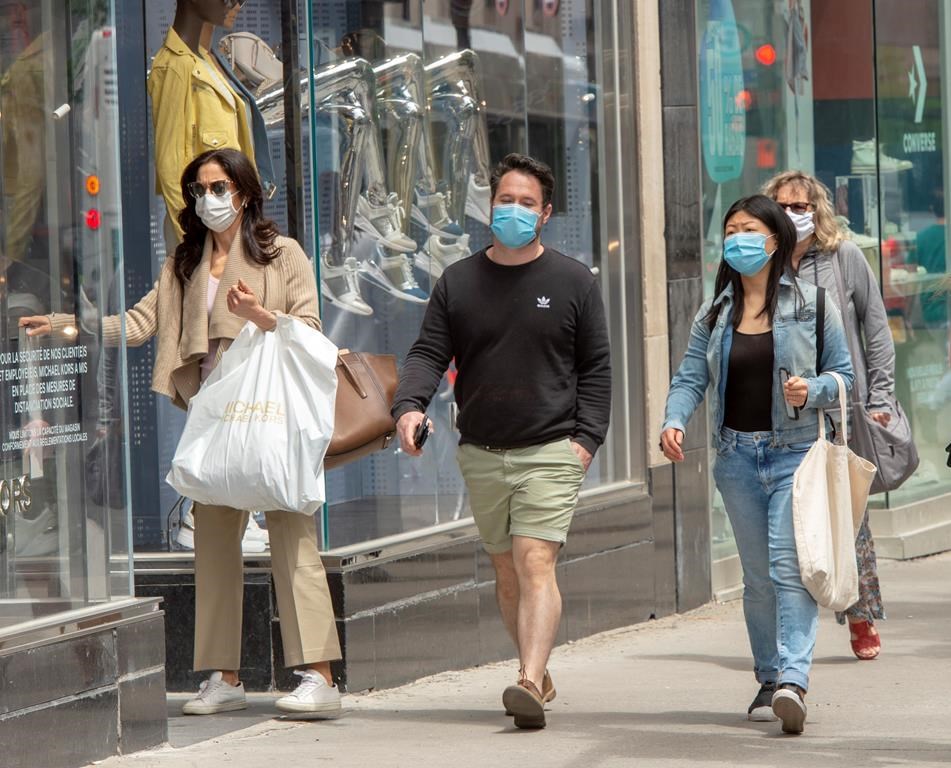The Quebec government announced new COVID-19 restrictions on Tuesday for the provinces red and orange zones, aimed at curbing the spread of cases linked to variants.

The new measures coming into effect in Montreal include the closure of gyms, the return to hybrid learning for high school students in grades 9,10 and 11, and reducing the maximum capacity in places of worship to 25 people.
Montreal’s top doctor says that while the situation has been stable in the city, unlike other regions of the province where the third wave has taken hold, the rise in variants is a concern.
“Variants now make up 42 per cent of new cases,” said Dr. Mylène Drouin, during a press conference on Wednesday. “What we’ve seen in other places, other countries, is that often when you hit 40 to 50 per cent, you see an acceleration of new cases.”
There are currently 142 outbreaks linked to the variant first discovered in the U.K. but Drouin said they are small, with the majority made up of less than 10 cases.
Over the last three weeks, Montreal has seen a slight upward trend in the number of new cases, but that is expected to change in the next few days.
Drouin explained that Montreal, because of its urban context where there is a high density of the population and lot of people living in small apartments, remains especially vulnerable to the spread of the virus.

Get weekly health news
She also mentioned that many living in marginalized communities are often unable to abide by public health guidelines and face barriers when trying to isolate when they contract the virus or are identified as a close contact.
Drouin also said an increase is expected as a result of the loosening of certain measures two weeks ago, and the Easter holiday weekend, coupled with the higher transmissibility of variants.
Drouin said that while the city has been successful in slowing the spread of variants through a “suppression” approach, which involves quickly shutting down the place of outbreak and isolating contacts, officials are bracing for the third wave.
As is the case across the province, the situation in hospitals is always a primary concern.

In Montreal, there are currently 265 patients in hospital, including 71 being treated in the intensive care unit, according to Sonia Bélanger president of the regional health authority, CIUSSS Centre-Sud de Montreal.
“The number in ICU is preoccupying,” Bélanger said.
She explained that with variants, the patients that are being hospitalized are younger, very sick and require longer hospital stays, adding extra pressure on health-care workers who have been on the front lines for over a year.
In recent weeks, Drouin said, what has been observed with variants is that those aged 45 to 55 are 70 per cent more likely to be hospitalized if they become infected with a variant, as opposed to those who are infected with the novel coronavirus.
She also pointed out that those getting sick have yet to be vaccinated.
The city, however, has so far reached its benchmarks in terms of vaccinations with wide coverage achieved for seniors, according to Drouin.
So far, 23 per cent of the population has received at least one dose of the COVID-19 vaccine. A breakdown by age group shows 86 per cent of those over 80 have been vaccinated, 84 per cent for those aged 70-79 and more than 68 per cent of the 60-69 age group have also been vaccinated.
“With appointments coming this week we will have reached our goals,” she said.
Vaccination in Montreal is now opening up to those with chronic illnesses such as cancer, dialysis and transplant patients. Essential workers, such as teachers in elementary and high schools, daycare workers, police officers and community workers will also be able to book appointments.
The AstraZeneca vaccine is also being made available for those 55 and over at seven locations across the island. No appointments are necessary. The list of vaccination sites is available on the Quebec government website.
— With files from Global News’ Gloria Henriquez and Kalina Laframboise









Comments
Want to discuss? Please read our Commenting Policy first.